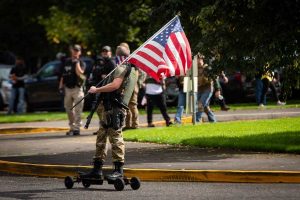The Rittenhouse Verdict and a Supreme Court Case Could Spell an 'Open Season' on Protesters

Today, Kyle Rittenhouse was acquitted on all charges after killing two people and wounding another while he was conducting his own armed vigilante patrol of Kenosha, Wisconsin, in response to Black Lives Matter protests. Earlier this month, the Supreme Court heard oral arguments in a case about whether people have a constitutional right to concealed-carry permits.
Why am I talking about these two things together? Because in combination, these two cases could mean that it is soon going to be open season on racial-justice protesters around the country.
The Rittenhouse verdict is obviously very concerning for racial-justice protesters. Rittenhouse said he went to Kenosha the night of Aug. 25, 2020, to protect property. He did so by openly brandishing a semi-automatic rifle through the streets of the city in the midst of unrest over the shooting of Jacob Blake. While patrolling the streets, there was gunfire that resulted in some of the Black Lives Matter protesters thinking Rittenhouse was attacking them. They charged Rittenhouse, and he opened fire, killing Joseph Rosenbaum and Anthony Huber and injuring Gaige Grosskreutz.
Rittenhouse was charged with six different felonies, including homicide, recklessly endangering safety, and illegal weapon possession. Earlier today, after almost four days of deliberations, a Wisconsin jury acquitted him on all charges. As a result, even though he went to Kenosha to brandish a weapon and wound up killing two people, Rittenhouse walks out of the courthouse today a free man.
Responses to the Rittenhouse acquittal have fallen largely upon predictable lines. But a particular thread of the right-wing response should be even more concerning than the general support the conservative movement has shown to him. One outlet is reporting that far-right groups are looking at the verdict as “precedent for future street violence” in response to protests, such as those that may happen this weekend because of the verdict. And U.S. Rep. Madison Cawthorn came out with a statement this afternoon that the verdict is cause for celebration and that his supporters should “Be armed, be dangerous.”
The Rittenhouse verdict comes on the heels of the oral argument in an important Second Amendment case before the Supreme Court, addressing the right of people to carry weapons in public. The case, argued on Nov. 3, raises the question whether states can deny people concealed-carry permits without an extraordinary reason for doing so. At oral argument, the court’s 6-3 conservative majority seemed poised to rule that the Constitution protects the right to such permits. It might not be an unlimited right, as some of the court’s conservative justices expressed concern that there should not be a right to carry a weapon in crowded spaces, such as sports stadiums or Times Square on New Year’s Eve.
But beyond that, the justices seemed very willing to proclaim that everyone has a right to carry a weapon in public. Their basic reasoning goes to the heart of the Rittenhouse case. To the court’s conservatives, the world is a place where you always need a weapon because of the ever-present possibility you will be attacked and need to use your gun in self-defense. This is exactly the defense Rittenhouse successfully used in his trial.
The Supreme Court won’t rule on this case until next year, probably in late June. But the writing is on the wall given the questioning earlier this month and reveals just how conservative this set of justices is. There’s never a guarantee, but almost everyone believes that by the middle of next year there will be a constitutional right to carry a weapon in public, maybe with a few exceptions.
What this means in conjunction with the Rittenhouse verdict is very scary for all, but especially for racial-justice protesters everywhere. With a proliferation of concealed-carry permits and a sense among the far right after today’s verdict that they have the freedom to patrol racial-justice protests and act as vigilantes, the court system’s message couldn’t be clearer — anyone who protests against racial injustice risks taking their lives into their own hands.
Source: Read Full Article
